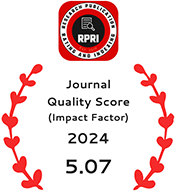Nutritional Value of Eggs in Human Diet
DOI:
https://doi.org/10.55544/jrasb.3.1.28Keywords:
Egg, nutritional benefits, healthAbstract
Poultry is one of the most widespread food industries worldwide. Chicken is the most farmed species, with over 90 million tons of chicken meat produced per year [19]. Eggs have been a human food since ancient times. They are one of nature’s nearly perfect protein foods and have other high-quality nutrients. Eggs are readily digested and can provide a significant portion of the nutrients required daily for growth and maintenance of body tissues. They are utilized in many ways both in the food industry and the home. The term “eggs”, without a prefix, generally relates to chicken eggs and is so considered in this study [23]. Chicken eggs are one of the best sources of high-quality protein along with important vitamins and minerals. In both developed and developing countries an increased egg production and consumption could significantly improve nutritional needs of adults and children. Eggs are also an economical source of nutrients for a healthy diet and life, especially important for the mental development of growing children [19]. The purpose of this study is to describe the nutritional benefits of eggs in the human diet. Hence, in this study methodology/approach; the scientific literature was searched using Medline and key words relevant to eggs, egg nutrients and it is nutritional roles.
Downloads
Metrics
References
Aima Zaheer, (2013). Countries with Highest Egg Consumption, https://finance.yahoo.com/news/top-20-countries-highest-egg-155805103.html
China has ample supply of eggs despite global market shortage in 2023 caused by bird flu: agricultural experts. https://www.globaltimes.cn/page/202304/1288877.shtml
Conway A (2012). China Remains World’s Top Egg Producer in 2012. WATTAgNet.
Ehr I. J., M. E. Persia, and E. A. Bobeck, (2017). Comparative omega-3 fatty acid enrichment of egg yolks from first-cycle laying hens fed flaxseed oil or ground flaxseed, J. of Poult Sci. 96(6): pp. 1791–1799.
Food & Nutrition Australia, Nutritional and Health Benefits of Eggs, February 2013
Food and Agricultural Organization (2017). FAO Publications Catalogue 2017. United Nations: Food and Agricultural Organization.
Food and Agriculture Organization of the United Nation, STATISTICAL YEARBOOK, 2022.
Food and Agriculture Organization of the United Nation, STATISTICAL YEARBOOK, 2023.
Fraeye, I., Bruneel, C., Lemahieu, C., Butse, J., Muylaert, K. and Foubert, I. (2012). Dietary Enrichment of Eggs with Omega-3 Fatty Acids: A Review. Food Research International, 48, pp. 961-969. http://dx.doi.org/10.1016/j.foodres.2012.03.01
Khalid Zaheer, (2015). An Updated Review on Chicken Eggs: Production, Consumption, Management Aspects and Nutritional Benefits to Human Health, Food and Nutrition Sciences, 6, pp. 1208-1220, http://www.scirp.org/journal/fns http://dx.doi.org/10.4236/fns.2015.613127
Layman, D.K. and Rodriguez, N.R. (2009). Egg protein as a source of power, strength, and energy, Nutrition Today, Vol. 44 No. 1, pp. 1-6.
Li-Chan, E.C.Y., Kim, H.-O., (2008). Structure and chemical composition of eggs. In: Mine, Y. (Ed.), Egg Bioscience and Biotechnology. Wiley-Interscience, Hoboken, NJ, pp. 1-8.
Marcia M. English, (2021). The chemical composition of free-range and conventionally-farmed eggs available to Canadians in rural Nova Scotia, Peer J 9:e11357 DOI 10.7717.
Pieter Evenepoel, Benny Geypens, Anja Luypaerts, Martin Hiele, Yvo Ghoos4 and Paul Rutgeerts, (1997). Digestibility of Cooked and Raw Egg Protein in Humans as Assessed by Stable Isotope Techniques, J. of American Society for Nutritional Sciences, https://pubmed.ncbi.nlm.nih.gov/9772141/
Poultry Industry Statistics (2023): Meat & Egg Production, https://www.chickenfans.com/poultry-industry-statistics/#Global-Egg-Production
Rodriguez, N.R. (2005). Optimal quantity and composition of protein for growing children, Journal of the American College of Nutrition, Vol. 24 No. 2, pp. 150S-4S.
Ruxton C.H.S., (2010). The nutritional properties and health benefits of eggs. J.Emerald Nutrition and Food Science, Vol. 40 No. 3, pp. 263-279.
Ruxton, C. (2013). Value of Eggs during Pregnancy and Early Childhood. Nursing Standard, 27, 41-50. http://dx.doi.org/10.7748/ns2013.02.27.24.41.e7343
Shi Lei, (2021). The Role of Chicken Eggs in Human Nutrition, journal of food nutrition and metabolism |issn 2674-2411, www.sciencerepository.org
Shin, J.Y., Xun, P., Nakamura, Y. and He, K. (2013). Egg Consumption in Relation to Risk of Cardiovascular Disease and Diabetes: A Systematic Review and Meta-Analysis. American Journal of Clinical Nutrition, 98, pp. 146-159. http://dx.doi.org/10.3945/ajcn.112.051318
Sophie Réhault-Godbert,* Nicolas Guyot, and Yves Nys, (2019). The Golden Egg: Nutritional Value, Bioactivities, and Emerging Benefits for Human Health. MDPI Nutrients, 11(3): pp. 684.
Sugino, H., Nitoda, T., Juneja, L.R., (1997). General chemical composition of hen eggs. In: Yamamoto, T., Juneja, L.R., Hatta, H., Kim, M. (Eds.), Hen Eggs: Their Basic and Applied Science. CRC Press, New York, pp. 13e24.
Werner Grosch and Peter Schieberle, (2008). German Research Centre for Food Chemistry, https://www.researchgate.net/publication/227046039
Downloads
Published
How to Cite
Issue
Section
License
Copyright (c) 2024 Rizwanullah Rafed, Mohammad Hassan Abedi, Mohammad Hamid Etmadi

This work is licensed under a Creative Commons Attribution-NonCommercial-NoDerivatives 4.0 International License.


















